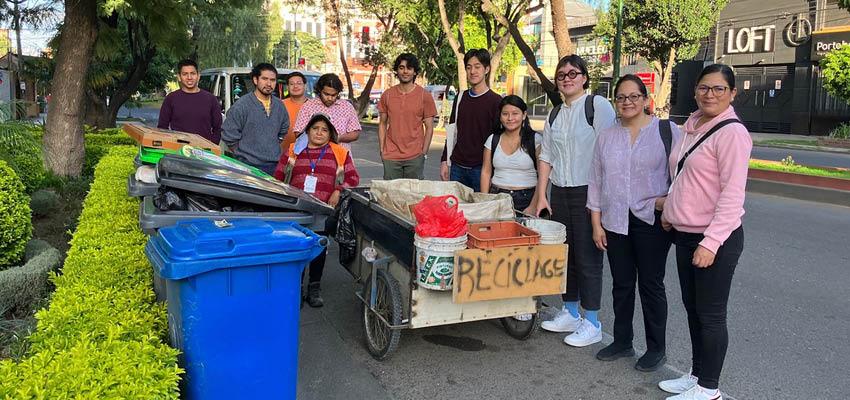
Getting started
Through the D-Lab: Development class, we learned about local waste management and sustainability efforts in Cochabamba, the fourth largest city in Bolivia. The previous year, D-Lab established a connection with the Ecorecolectoras – a women-led association of waste pickers in Cochabamba – to support their important work to protect the environment and provide decent jobs. We built on this connection during class and met remotely with the association leaders as well as students and faculty at the Applied Technology Research Center (CITA) at the Higher University of San Simón (UMSS), a local university partner.
The project that the three of our organizations are working on is around the theme of Kutimuy. Kutimuy is a Quechua word meaning “return” and relates to the goal of fostering a circular material economy in Cochabamba. This sustainability goal significantly involves the contribution of the Ecorecolectoras and similar groups, so ensuring they have efficient tools and ample resources is key. Before embarking on our trip to Cochabamba during IAP, we discussed with the Ecorecolectora the challenges they face in their daily operations – which we would better understand in person.
The primary goals of our trip were to:
- witness the work and organization of the Ecorecolectoras
- meet stakeholders that impact waste management and upcycling in Cochabamba
- support the Ecorecolectoras through a Creative Capacity Building workshop at UMSS – including advancement on technologies and new business plans.
Below you will find Part 1 of a two-part blog post series. Part 2 can be found here.
The first week of our trip involved meetings, site visits, and research to understand the context in which we would support Kutimuy.
A week full of insights
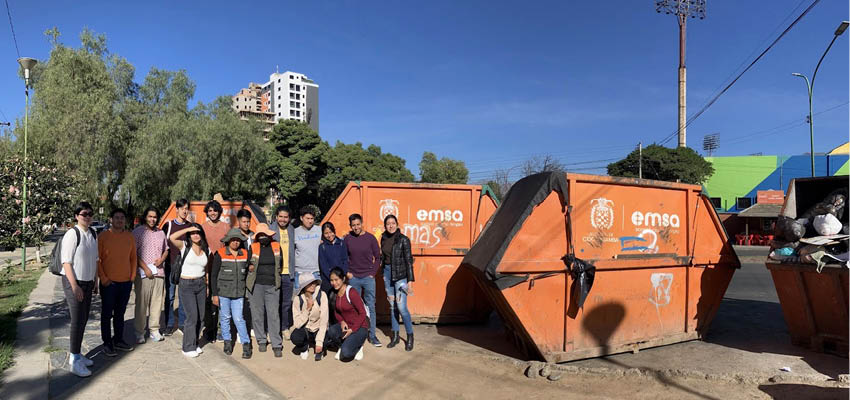
Our team in Bolivia included D-Lab students Daud Shad; Prabhav Sharma, and Jeremy Zhou from MIT; Gigi Sung from Harvard; and Camila Becerra from Wellesley. (MIT student Jacqueline Prawira was part of our team during the fall term but didn't join the trip.)
Our journey with the Kutimuy project in Cochabamba commenced by shadowing the Ecorecolectoras along with our UMSS peers. We began with a route walk, immersing us in the realities of the Ecorecolectoras’ daily grind. From the early morning to the late-night shifts, these workers navigate the city, collecting recyclables from partnered businesses and sifting through materials at the city’s designated “Orange Points.” These materials must then be transported for sale to recycling companies, often far distances.
Engagement with the Cochabamba Department’s government further illuminated the challenges and opportunities within the waste management sector. We met with the head of regional planning, and we even witnessed the governor finalizing a relevant law during a public meeting. Discussions revealed the existence of 350 small waste processing companies and a recent legislative move incentivizing the formal sector to engage with the informal sector recyclers. This intricate tapestry of efforts underscored the importance of our mission: to enhance the operational efficiency and economic sustainability of the Ecorecolectoras through innovative solutions and partnerships while contributing to material circularity in Cochabamba.
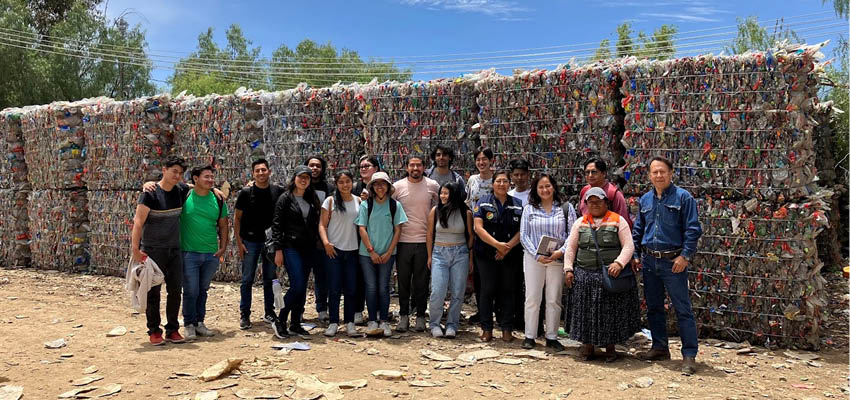
The next day, we continued engaging with a broad spectrum of stakeholders that influence and are influenced by the Ecorecolectoras’ mission. Our initial meetings with the Chamber of Industry (ICAM) - CIERVA program sponsored by Swisscontact, which specializes in markets for recycling, offered insights into potential support for the Ecorecolectoras’ upcycling project. This non-profit can provide assistance with business development and enhancing sustainability practices.
We then discussed with recycling companies like EMPACAR, which works directly with the Ecorecolectoras by purchasing PET plastics for further processing (the amount purchased daily is about 100 kg for 250 bolivianos). This collaboration, while beneficial, also revealed that Ecorecolectoras may have comparative disadvantages in terms of production capacity. This realization affirmed our approach to Creative Capacity Building, which could strengthen the community’s customized production capacity.
Another meeting was with CADEMET, a company specializing in scrap metal. Their working relationship with the Ecorecolectoras underscores the interconnectedness of the recycling ecosystem (5-10% of their material is purchased from the association). However, CADEMET faces challenges in providing transportation for the collected materials, highlighting a logistical gap in the recycling chain that needs to be addressed.
Venturing into the academic sphere, we had a consultation with four academics from the Bolivian Urbanism Institute to discuss urban planning, sustainability, and informality issues. They highlighted the precarity and vulnerability of Ecorecolectoras within Cochabamba’s more extensive waste management system. They also enlightened us with a strategic approach that would benefit from adopting informality in Ecorecolectoras’ operations. We also interacted with a restaurant and bar association called ASERAC, which showed interest in upcycled glass products. This meeting further broadened our perspective on the potential for sustainable business models.
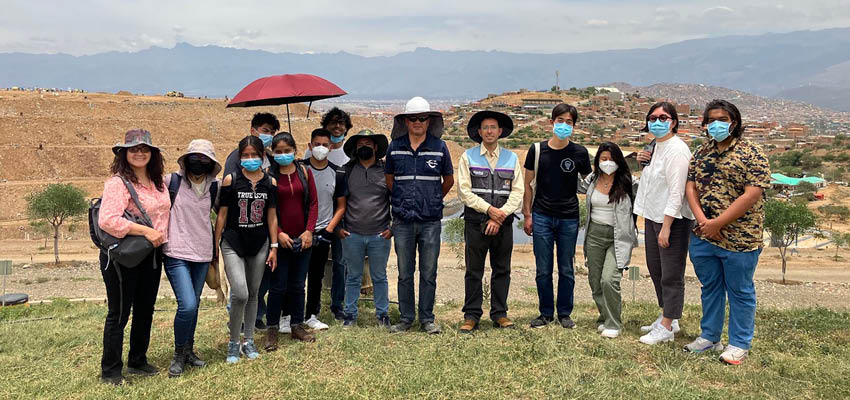
The following day we visited important public sector stakeholders. We started off meeting with officials of EMSA, the city’s main waste contractor. EMSA manages most of the city’s recycling, so it was insightful to understand the relationship between the formal and informal waste management sectors. We visited the K’ara K’ara landfill, which was recently transformed by Colina, an environmental company, into a sanitary landfill. There are partnerships at the landfill for local workers to sort recyclable materials.
We then went to the city’s Human Development and Women’s Empowerment offices to learn about available support for entrepreneurs like the Ecorecolectoras. There are some scholarships for skill-building, including in the artisanal market, which could be helpful.
The final day of our first week started at UMSS. On campus, we met a businessman from a manufacturing company called PRODAL who seeks to expand his foundry for aluminum. As such, we discussed how the Ecoreoclectoras, who collect aluminum, could sell the material to the company after some cleaning and processing. Though this business idea didn’t become one of our workshop projects the following week, it could be a future endeavor.
Our meetings during the week revealed potential business opportunities in upcycling materials like glass, but we hoped to get more information. To dig deeper into potential Kutimuy markets, we went with our UMSS peers to the Boulevard, a central dining district in the city. There, we split into small groups with questions to gauge local establishments’ demand and interest in glass products from the Ecorecolectoras. Our overall takeaway was that there is a general interest in purchasing recycled glass products, especially drinkware that can be personalized.
Looking ahead
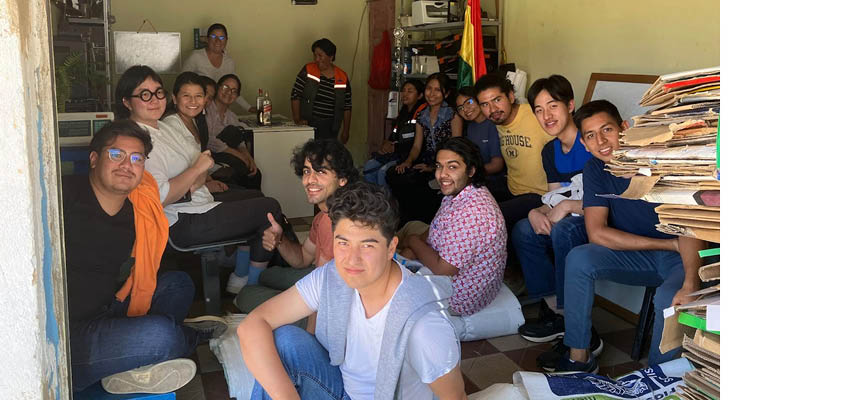
Our first week in Cochabamba exposed us to the city’s various facets of waste management. We are grateful for the opportunity to have met so many stakeholders in the sector and learn about work toward a circular economy. The insights and interactions from this week set the stage for our Creative Capacity Building workshop the following week.
This is Part 1of a two-part blog post series. Part 2 can be found here.
About the authors
Daud Shad is currently a second-year master's student at MIT in city planning, with a focus on international development.
Gigi Sung is a masters' student at Harvard in urban planning.
More information
MIT D-Lab class: D-Lab: Development
MIT Program: Inclusive Economies
Contact
Libby Hsu, MIT D-Lab Associate Director of Academics

